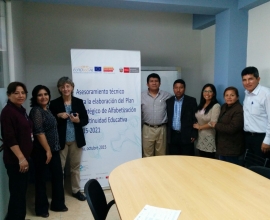EUROsociAL supports preparation of Peru's 2015-2021 Strategic Plan for the National Literacy and Continuing Education Programme
The technical advising has now concluded. It was supported by the expertise of a civil servant from Spain's Ministry of Education, Culture and Sport, an expert on literacy and adult education
The activity enabled the Directorate-General of Alternative Basic Education of the Ministry of Education of Peru to prepare the Strategic Plan for the National Literacy Programme. This aims to drive efforts to meet expectations associated with the educational demand of young people and adults over the age of 15 who do did not participate in the educational system on a timely basis or who have not completed their basic education.
According to the diagnosis of the situation of literacy and continuing education conducted within the framework of this activity, in 2014 the number of persons in the country over the age of 14 who are illiterate or do not have a primary education certificate was 8,784,304 (36% of Peru's population).
Because of this situation, the Ministry of Education decided to prepare, with the support of the EUROsociAL Programme of the European Union, a strategic plan to implement the National Literacy Programme by defining achievements and targets to be reached by 2021. These are, among others, to guarantee access to quality learning and completion of schooling; to guarantee an education for working and the acquisition of entrepreneurial skills by young people and adults who obtain their certificate; to guarantee equal opportunity in access to basic education; to strengthen Alternative Basic Education Centres (CEBA) as quality educational institutions and engines for implementation of the new alternative basic education (EBA) model within the framework of decentralised management; and to define a new EBA model that is sustainable, inclusive, flexible, and decentralised.
Lastly, the plan establishes four strategic lines to accompany its implementation. These are: improvement of the pedagogical approach, strengthening of skills, institutional management, and coordination with decentralised educational management entities, and, lastly, partnerships with the institutional spaces generated by civil society.
IILA

